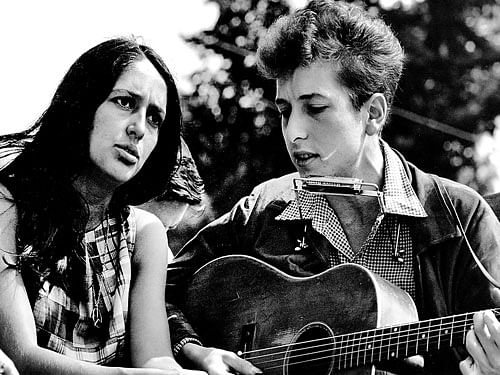
Listening to a Horatta programme recently, one was reminded of the importance of songs to register protest or express a political opinion.
There is something about hearing words set to tune, which can make a deep impression on one’s mind. When John Lennon first sang the song “All we are saying is give peace a chance” with Yoko Ono in May 1969, it was part of a “Bed-In,” that took place in Queen Elizabeth’s Hotel in Montreal.
Their idea was to promote world peace and it worked, as the media and other singers flocked to their hotel room to jam and provide vocal support to the cause.
But possibly, even Lennon did not realise the impact that this song would have on the anti-war movement, especially for the many Americans who were unhappy about America’s presence in Vietnam.
In October 1969, in a demonstration titled, “The Moratorium to End the War in Vietnam”, this song became the anthem for protestors who gathered across the US and sang it en masse.
Lennon is said to have been deeply moved on viewing the television footage of half a million anti-Vietnam protestors singing this song outside the White House, and termed it “one of the biggest moments of my life”!
Lennon is just one among the many singers who used their music and their celebrity status to make a difference. It may be possible to name only a few of them here.
Joan Baez is a favourite folk singer whose activism encompassed the environment, women’s and children’s issues, as also civil rights and the peace movement, during the turbulent 1960s in the US.
She was among the earliest musicians to use her success to sing and march for a cause and is also known for bringing fame to the songs of the then relatively unknown Bob Dylan.
Baez visited Vietnam in December 1972 and she and her travelling companions survived what came to be known as the Christmas Bombings that lasted for 11 days over Hanoi and Haiphong.
She commemorated this experience by writing, “Where are you now, my son?” which has this heartrending last verse, “And I can only bow in utter humbleness and ask/ Forgiveness and Forgiveness for the things we have brought to pass.”
It goes on to speak of “rows of tiny coffins we have paid for with our souls”, and ends with the tragic, “I’ve heard that the war is done/ Then where are you now, my son?”
Among the songs of protest, one that stands out for me is Paul Robeson’s “Old Man River”, which throws light on the plight of the Blacks who slaved away, whilst the Whites bossed over them. The song was introduced in the Broadway musical, The Showboat, and became an instant hit.
One verse goes like this, “Here we all work ’ong the Mississippi/ Here we all work, while the white boys play/ Gettin’ no rest from the dawn till the sunset/ Gettin’ no rest till the judgment day.” The song goes on about the injustice whilst talking about Old Man River, which goes on flowing without any reaction to what is happening around.
The Mississippi river becomes a metaphor for the indifferent White Man. My additional interest in this song is linked with Dada Saheb Phalke awardee, Bhupen Hazarika, who used the power of his music and lyrics for social commentary and political activism.
Hazarika was affected by the freedom movement and the desire for a free India and observed: “Somewhere down the line, the revolutionary in me was born. My music and later my film scripts portrayed that ethnic anger I suffered from.”
The song, “Old Man River” made such a great impression on Hazarika that when he met Robeson in the US, he discussed the possibilities of using music to make social and political observations.
Apart from absorbing American folk music, Hazarika joined Robeson at many civil rights’ rallies. Hazarika was able to make a strong connection with the masses because his lyrics touched on social issues and also held out promises of a bright future.
Hazarika’s all-time hit is “Bistirna parore”, the Assamese song written as a tribute to River Brahmaputra, which flows through the fertile land of Assam and bears witness to its history. This song picks up on the first line of Robeson’s “Old Man River” and then takes off beyond it.
When the song was later rewritten in Bengali and Hindi, River Ganga replaced Brahmaputra. Listening to Hazarika’s powerful rendition of “Ganga tu behti ho kyun” is guaranteed to give one gooseflesh, as one starts imbibing the message from the lyrics.
The song touches on the loss of morality and humanity and the increase in illiteracy, hunger and poverty and keeps questioning the inaction of the Ganga. Somewhere in the song, he says, “Nirlaj bhav se behti ho kyun” — you flow along shamelessly and without a care.
When required, at different points in history, singers have used the gift of music to protest against injustice. One is grateful to them and the much-needed counter-culture that raises its voice and demands a more equitable and just society.
Deccan Herald is on WhatsApp Channels| Join now for Breaking News & Editor's Picks